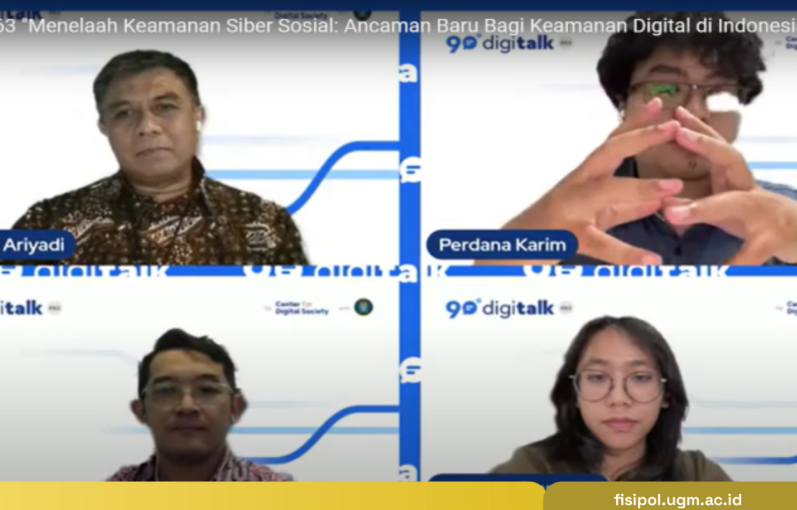
Yogyakarta, 24 January 2025–CfDS Fisipol UGM held another discussion session at the DigiTalk event, “Examining Social Cyber Security: Indonesia’s New Digital Threat?”. The discourse examined the problems developing amid increasingly massive digital transformation and the rise of online misinformation. Therefore, cybersecurity becomes crucial for integrating technological protection with socio-cultural awareness through effective regulation.
“Social cybersecurity focuses on manipulating and influencing individual humans, groups, or communities that impact social, cultural, and political behaviour. Both use technology, but the technology is not to steal credentials or take over an electronic system. But it is used to influence the mindset of the target, community, or group,” said Dhoni Kurniawan, Policy Analyst of the Indonesian National Cyber and Crypto Agency.
Meanwhile, independent research by CfDS revealed that there is still a gap between knowledge and terminology in studies between cybersecurity and other studies related to misinformation or hoaxes. “This knowledge gap can have an impact on the interpretation of regulations. Therefore, the BSSN, government, private sector, and ITE Law regulations must be sharpened to be more consistent in taking action against this cyber threat,” explained Tane Hadiyantono, a CfDS Researcher.
Then, this discussion also moved on to discuss bridging social cyber resilience from the social aspect of society. Especially with the background of Indonesian people, a society of gadget users who spend more than six hours using gadgets, Indonesia is ranked first, followed by Thailand and Argentina, according to the “State of Mobile 2024” Report.
“I see that at the root of the problem is our dependence on digital devices and content, which is very high due to technological innovation. So there are social changes not anticipated by the parties, both the government, private sector, and community leaders,” said M. Novel Ariadi, Co-Founder and Deputy Chairman of the Indonesia Cyber Security Forum (ICSF).
Thus, cyber social security requires holistic intervention, not just technical issues. More than that, mitigating social cyber threats requires an approach from the smallest scope to have resilience to social cyber. The common thread is that humans here rest as subjects in the middle of a social media ecosystem deliberately created to create dependency so that social cyber threats easily infiltrate it.
